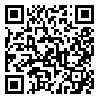Thu, Jul 17, 2025
[Archive]
Volume 21, Issue 4 (December 2025)
IJEEE 2025, 21(4): 3473-3473 |
Back to browse issues page
Download citation:
BibTeX | RIS | EndNote | Medlars | ProCite | Reference Manager | RefWorks
Send citation to:



BibTeX | RIS | EndNote | Medlars | ProCite | Reference Manager | RefWorks
Send citation to:
Abdullah S M, Atyia T H. A review Optimum Control of DC Motor Using Genetic Algorithm. IJEEE 2025; 21 (4) :3473-3473
URL: http://ijeee.iust.ac.ir/article-1-3473-en.html
URL: http://ijeee.iust.ac.ir/article-1-3473-en.html
Abstract: (197 Views)
Optimal control of DC motors remains a critical research area in modern control systems, given their wide industrial applications and the need for accurate performance under variable conditions. This paper explores the application of genetic algorithms (GAs) to optimize the control parameters of DC motors, particularly PID controllers, with the goal of improving the dynamic response and robustness of DC motor systems. Compared to traditional constraint-based tuning methods, GAs, inspired by natural selection and evolution, offer comprehensive search capabilities that significantly improve parameter optimization, providing better speed regulation, reduced overshoot, and minimal steady-state error. This review highlights the key challenges faced when using GAs. Comparative results from various studies demonstrate that GA-based controllers consistently outperform traditional tuning methods in terms of stability, efficiency, and adaptability. Key findings related to energy consumption and stability are highlighted. It is essential to analyze the system performance in terms of rise time (tr), settling time (ts), overshoot ratio (Mp%), and steady-state error (Ess). A proportional-integral-differential (PID) controller provides a stable response by tuning its parameters according to a specific methodology using a genetic algorithm. This paper concludes by emphasizing the potential of genetic generators as a powerful and flexible optimization tool for intelligent control of DC motors.
Type of Study: Review Paper |
Subject:
Adaptive Control
Received: 2024/09/28 | Revised: 2025/07/14 | Accepted: 2025/05/31
Received: 2024/09/28 | Revised: 2025/07/14 | Accepted: 2025/05/31
| Rights and permissions | |
 |
This work is licensed under a Creative Commons Attribution-NonCommercial 4.0 International License. |







